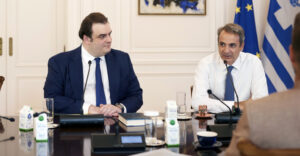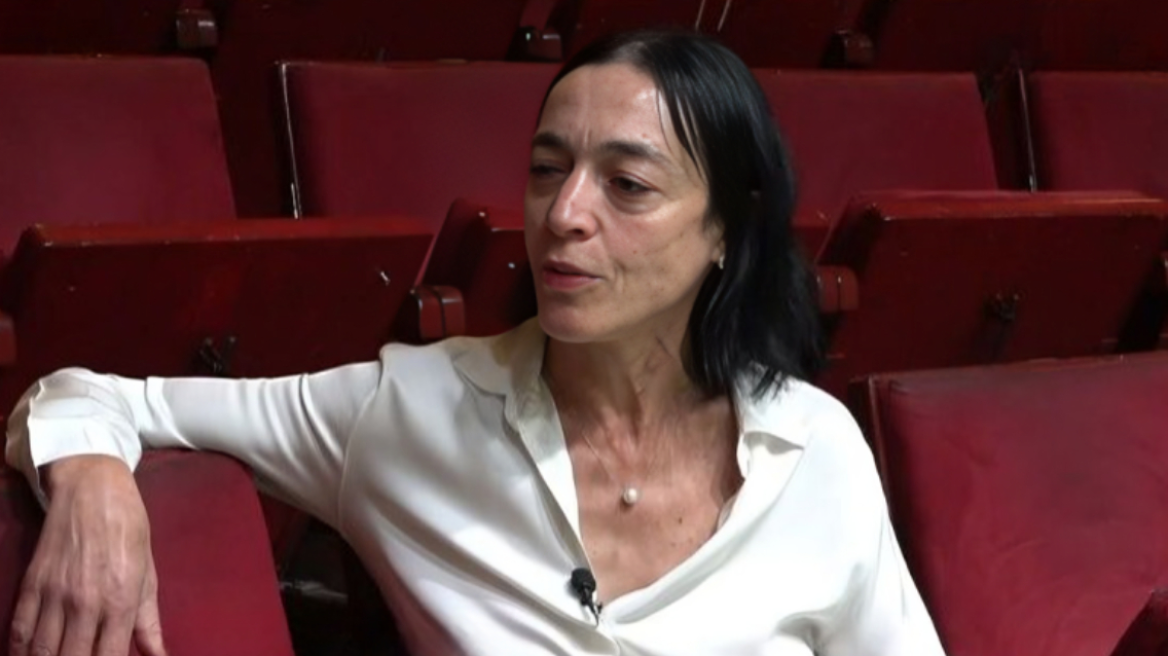The 11 changes that will improve the teaching process and school life in the coming school year, which starts on September 11, were unveiled during a meeting led by Prime Minister Kyriakos Mitsotakis with the leadership of the Ministry of Education, Religious Affairs and Sports.
During the meeting, the Prime Minister said: “We are meeting today with the political leadership of the Ministry of Education, Religious Affairs and Sport to discuss the significant changes in our schools ahead of the next academic year. If I had to attempt to categorize the very important 11 changes that the Minister and the Deputy Minister will have the opportunity to talk about in more detail in the coming days, I would divide them into three distinct categories.
The first is human resources: 10,000 new permanent teacher hires for the next academic year, adding to the 27,500 hires that have already been made since 2019.
The government’s policy is being implemented with absolute consistency and involves the gradual replacement of substitute teachers with regular staff, with permanent teachers, with obvious benefits for them and for the educational process as a whole.
The second area in which the Ministry is investing heavily is the technology sector overall. 28,500 interactive whiteboards have already been installed in schools across the country, from Grade 5 to Grade 3, and we expect the rest to be installed until we reach 36,000 by the end of the year.
I want to remind you that this is also an intervention that is funded by the Recovery Fund, and at the same time we are significantly enriching the educational content with excellent materials that are now being made available to teachers so that the lesson from Grade 5 onwards becomes much more meaningful, much more interactive and much more interesting for both teachers and children.
I also want to focus separately on the implementation of the digital tutorial, which will start working from September 16 for the children of the third grade. We are offering the possibility of a free digital tutorial with excellent teachers, covering all the subjects tested in the national examinations. This is, I believe, a very useful tool for our fellow citizens who cannot afford to send their children to tutorials, but also for the remote areas of the country where considerable time and effort is required to move children if they wish to have additional support from a tutorial.
The third category that I want to focus on relates more generally to issues of educational process and attitudes. The stop-bullying platform has already borne fruit and I believe that it is a very important tool at the disposal of students and teachers alike to be able to highlight such incidents and to be able to deal with them with discretion and effectiveness, preferably within the school unit.
But I also want to dwell on the broader changes that we are making in behavioral issues. Some would call it tightening up, I would call it streamlining the way we deal with offending behaviour in school. It is something that we have been urged to do by teachers and parents alike. The reintroduction of, say, the five-day suspension or even, in exceptional cases, the change of school environment, we believe these are interventions which, at this juncture, are imperative.
I also want to pause and commend the Ministry for the fact that we are constantly enriching educational work with actions that ensure that our students become more active citizens. And I am glad because these actions are now finding their place at the core of the educational process.
As I am particularly pleased that within the year we will now add vocational guidance services for children in the first grade, with special skills tests, so that we can make it easier for children at this critical age to understand what their skills are and begin to direct them towards career paths that are more in line with their aptitudes, interests and talents.
Finally, I want to make a special mention of a major effort that we will begin this year in earnest and in which we want the support of all students, parents, and teachers. And this effort has to do with the fact that cell phones should have no place in schools. The cell phone can be brought to school by the student, but it should be in the bag during the entire school day.
And the reason why we want to be very insistent on this effort is very simple. The scientific evidence now on how mobile phone use during the school day affects the learning process itself is catalytic. From distraction to other important issues, it is clear that mobile has no place in school during the daytime.
“Mobile in the bag,” then, is the motto we want to open schools with this academic year. It’s a new effort. I want to emphasize that many European countries are moving in this direction. We don’t necessarily have a requirement to have 100% compliance from the very first moment, but we want to explain to children parents, and teachers why the student in the school must be committed to the educational process.
Using tablets whenever necessary, but without the distraction that is unfortunately inevitably caused when students spend long hours on social media platforms. And I think all parents fully understand what I’m saying.
So we are starting this great effort with the start of the new school year and I think it’s something that can only have positive benefits overall for the educational process in our schools.
So the minister and the deputy minister will have the opportunity in the next few days to present in much more detail the innovations in our schools for the next school year. Again, I congratulate the entire leadership of the Ministry of Education for the very important work that is being done in this area.”
For his part, the Minister of Education, Religious Affairs, and Sports Kyriakos Pierrakakis said: “Mr. Speaker, 11 changes that we have had the opportunity to present to you today and that you have just referred to are changes that parents, teachers, and, first and foremost, students will see from the start of this school year and are the beginning of a series of very big changes.
This year, as is the direction you have given us, will be “the year of the school,” there will be several reforms that will affect the school as a whole. These are all things that are already in place to start at the beginning of this year. More will be added along the way, by the directions you have given us.
.
And just a very, very brief mention of the last piece that you mentioned, which is the ban on the conspicuous possession and use of cell phones in schools, which is essentially the addition to all of the previous ones that we’ve had the opportunity to present in the past together.
It’s something that all the international literature also emphasizes that should be done in schools. It is something that we see many other countries in the European Union and internationally implementing one after another. It also has to do with guidelines given by UNESCO.
.
And let me close, Mr. Speaker, with a personal note, given that we are making this ban on conspicuous occupation. I would like to think that I am the last Minister to whom you would apply the term “technophobic”. So in that sense, I think it is something that is now commonly accepted by the people who are handling this issue that it has to happen and we will make sure that it happens in the best possible circumstances and with the best possible care.”
The 11 changes the 2024-25 school year brings
As noted at the meeting, for the 2024-25 school year, 10,000 permanent teacher appointments of all disciplines have yet to be made, resulting in more than 37,500 teachers and teachers being added to the public school teaching staff from 2019 to date.
An overview of the new teaching resources being launched this year was also provided. The pilot live deliveries of the free digital tutorial will start on September 16 for the nationally examined subjects, while the asynchronous supportive deliveries component has already been launched for all students, in the first phase for the Modern Greek language and mathematics subjects in the three grades of secondary school. By the end of 2025, 2,500 easy-to-understand, concise videos will be posted for 47 subjects taught from the 5th grade to the 2nd grade, plus materials for history and mathematics in the 3rd grade.
In addition, autonomous classes for remote areas will be activated for the first time in the new school year, starting from Gavdos, where three teachers will teach the main lessons face-to-face, while the rest of the deliveries will be made live via videoconferencing.
Regarding the use of new technologies in the classroom, it was highlighted that the installation of interactive digital whiteboards for the needs of all grades from Primary 5 to High School 3 has now been completed at 78.6%, with 28,504 devices already in classrooms.
At the level of contact with parents and the fight against bullying, it was noted during the meeting that 1,433 profiles have now been created on the stop-bullying.gov.gr platform and more than 300 reports have been submitted.
At the same time, through the e-Parents application, parents and guardians are informed about children’s grades and announcements issued by the school unit, while very soon the additional possibility of informing them about absences, curriculum and the scheduling of meetings with teachers will be activated.
Particular reference was made to the new school operating rules, which include the new consequences framework. Among other things, Greece is added to the list of European countries taking measures against the use of mobile phones in school, banning the visible possession and use of mobile phones, and providing for increased penalties in cases where a student records classmates or teachers without consent.
The eighth change involves enriching the curriculum with Active Citizenship Actions, which are linked to the UN’s Sustainable Development Goals. The aim is to educate students in well-being, environmental care, social responsibility, and creative thinking.
In addition, from the new school year onwards, the computing course at secondary school is being reformed by updating the content of the textbooks and designing a new computing certificate, which is structured around four pillars: basic computing principles, data handling, and analysis, internet and networks, ethical/social aspects.
Methods and techniques of computer science, social and ethical aspects, ethics and ethics.
At the same time, school career guidance is being introduced online in upper secondary schools to support pupils in discovering their talents and aptitudes.
Emphasis is also placed on strengthening literacy. In all grades, from kindergarten to grade 3, reading, with assignments and activities, of entire literary works by leading Greek and foreign authors is introduced, instead of the fragmentary texts that were read until last year. The aim is to encourage and support students to love books and develop critical thinking. To this end, multiple books are also being promoted, which students will have access to from April 2025, initially in digital format.
Ask me anything
Explore related questions





